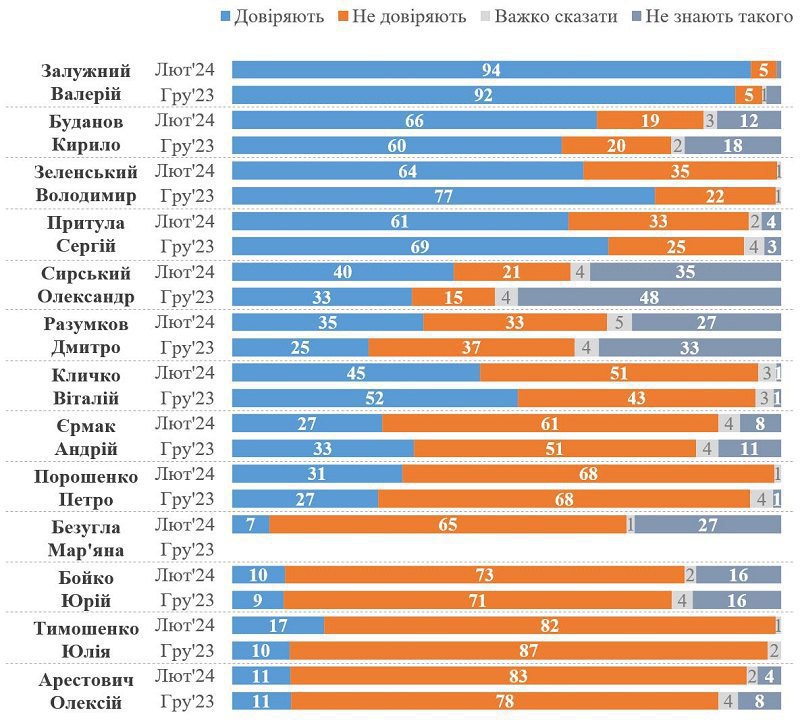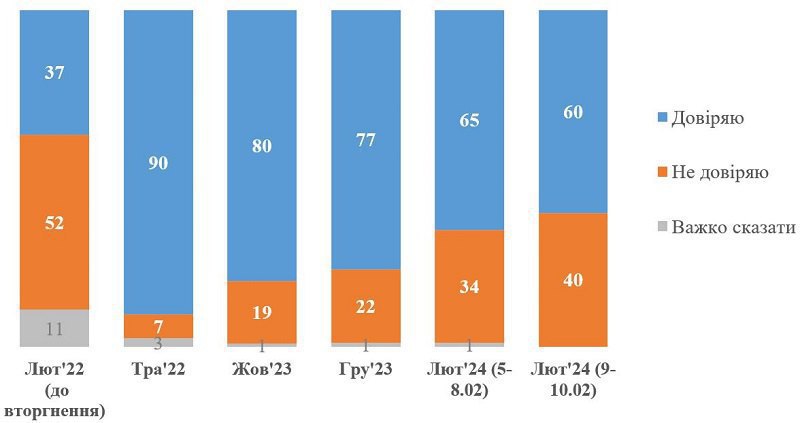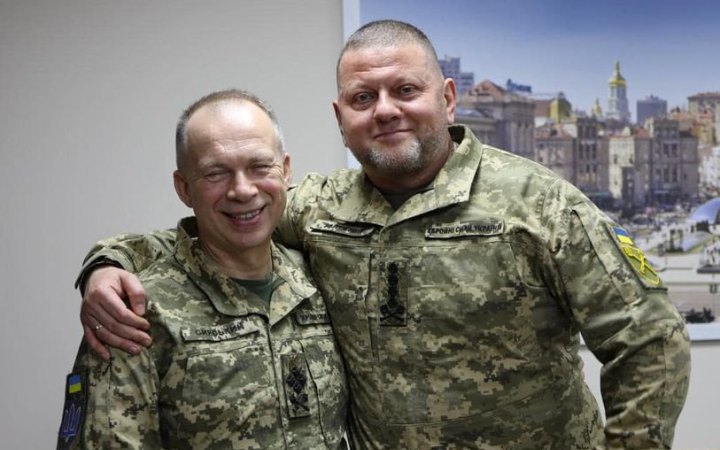40% of Ukrainians trust the new Commander-in-Chief of the Armed Forces of Ukraine, Oleksandr Syrskyy. At the same time, 35% did not know anything about him until February 2024. This is evidenced by the results of a survey conducted by the Kyiv International Institute of Sociology.
21% of respondents said they did not trust Syrskyy, while another 4% were undecided.
Among those who are familiar with Syrskyy’s activities and biography, 62% of respondents trust him and 33% do not. KIIS notes that these are data for beginning of February. Compared to December last year, the overall figures have not changed - 63% vs. 29%.
As for the former chief of the Armed Forces, Valeriy Zaluzhnyy, he still has the highest level of trust in society. He is trusted by 94% of Ukrainians, while only 5% do not trust him (compared to December, the situation has not changed much).
The majority of Ukrainians also trust the head of the Intelligence Service, Kyrylo Budanov, President Volodymyr Zelenskyy and Serhiy Prytula. Thus, trust in the head of the Defence Intelligence of Ukraine is 66% (and this figure has increased from 60% in December, while the share of those who do not trust has hardly changed - 19% now and 20% in December). Zelenskyy's trust is 64% compared to 77% in December (while distrust has increased from 22% in December to 35% in February). Prytula is trusted by 61%, and in his case, there is also a decrease in trust (from 69% in December, distrust has increased from 25% to 33%).
Former Speaker of the Verkhovna Rada Dmytro Razumkov has a trust-distrust balance close to zero, meaning that he is trusted about as much as he is distrusted. Thus, as of February, 35% trust him (an increase from 25% compared to December), 33% do not trust him (37% in December), and 5% have an undecided attitude. At the same time, 27% do not know him.
The following seven people have a negative balance of trust and distrust, i.e. they are distrusted more than trusted (and in all cases, at least half of Ukrainians do not trust them). For example, the mayor of Kyiv, Vitali Klitschko, is trusted by 45%, and distrusted by 51%. Since December, trust has decreased from 52%, while distrust has increased from 43%.
The Head of the Presidential Office, Andriy Yermak, is trusted by 27% (33% in December), while 61% do not trust him (51% in December).
Former President Petro Poroshenko is trusted by 31%, an increase from 27% in December. At the same time, the level of distrust has not changed - 68% now and 68% in December.
Finally, there are four figures with the lowest trust scores. Thus, MP Maryana Bezuhlya is trusted by 7%, and distrusted by 65%. Yuriy Boyko is trusted by 10%, distrusted by 73% (almost unchanged compared to December). Yuliya Tymoshenko is trusted by 17%, distrusted by 82% (the former Prime Minister has improved her performance, in December the ratio was 10% vs. 87%). Oleksiy Arestovych is now trusted by 11%, distrusted by 83% (also almost unchanged over the last two months).

In February 2022, before Russia's full-scale invasion, Zelenskyy was trusted by 37%. After the invasion, amid his actions and the overall effect of "rallying around the flag", his trust rose sharply to 90% as of May 2022. Then, between May 2022 and December 2023, i.e. in a year and a half, Zelenskyy's trust decreased by 13 percentage points - from 90% to 77%. Over the next two months, until the beginning of February, he lost another 12 percentage points - his trust dropped from 77% to 65%. Immediately after Zaluzhnyy’s resignation, trust in the president dropped by another 5 percentage points to 60%. Thus, in general, for the period of 5-10 February, 64% trusted Zelenskyy, but at the end of this period, the figure was 60%.

874 interviews were conducted before 8 February inclusive, i.e. before Zaluzhnyy’s resignation. The remaining 328 interviews were conducted after the resignation on 9 and 10 February. The survey was conducted with adult citizens of Ukraine (aged 18 and older) who were residing on the territory of Ukraine at the time of the survey (within the borders controlled by the Ukrainian authorities until 24 February 2022). The sample did not include residents of the territories temporarily not controlled by the Ukrainian authorities, and the survey was not conducted with citizens abroad.








